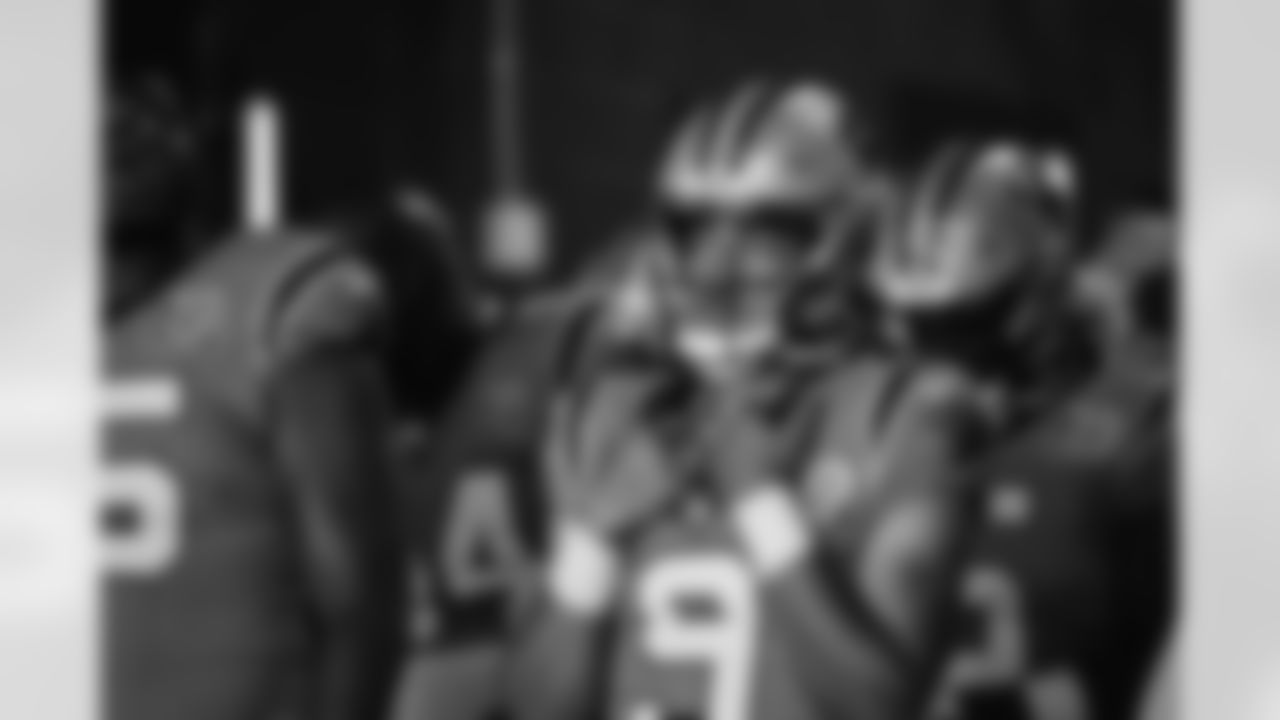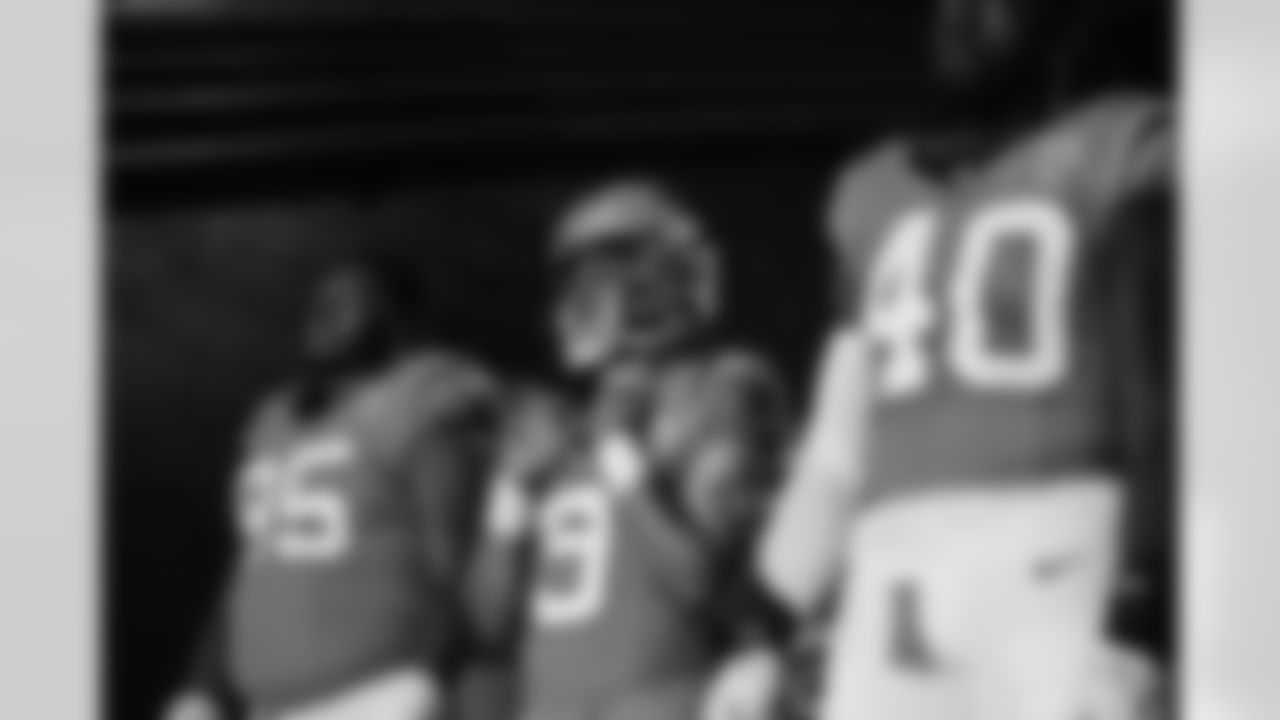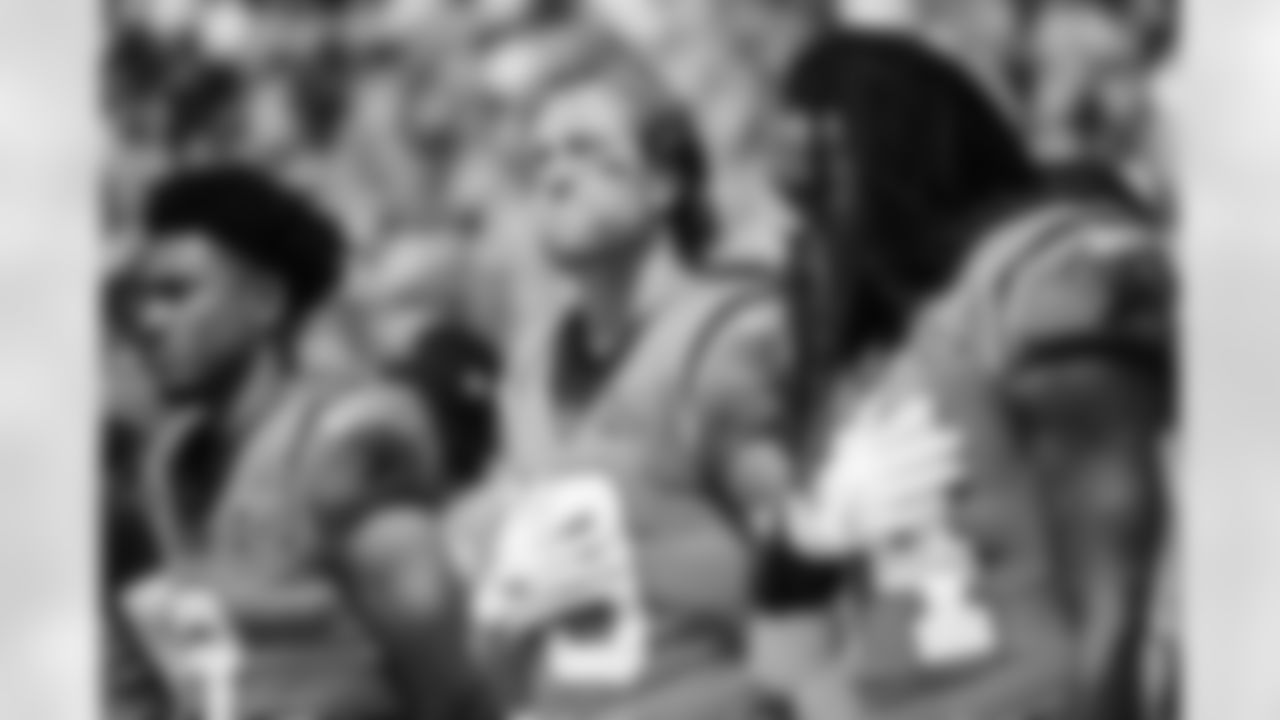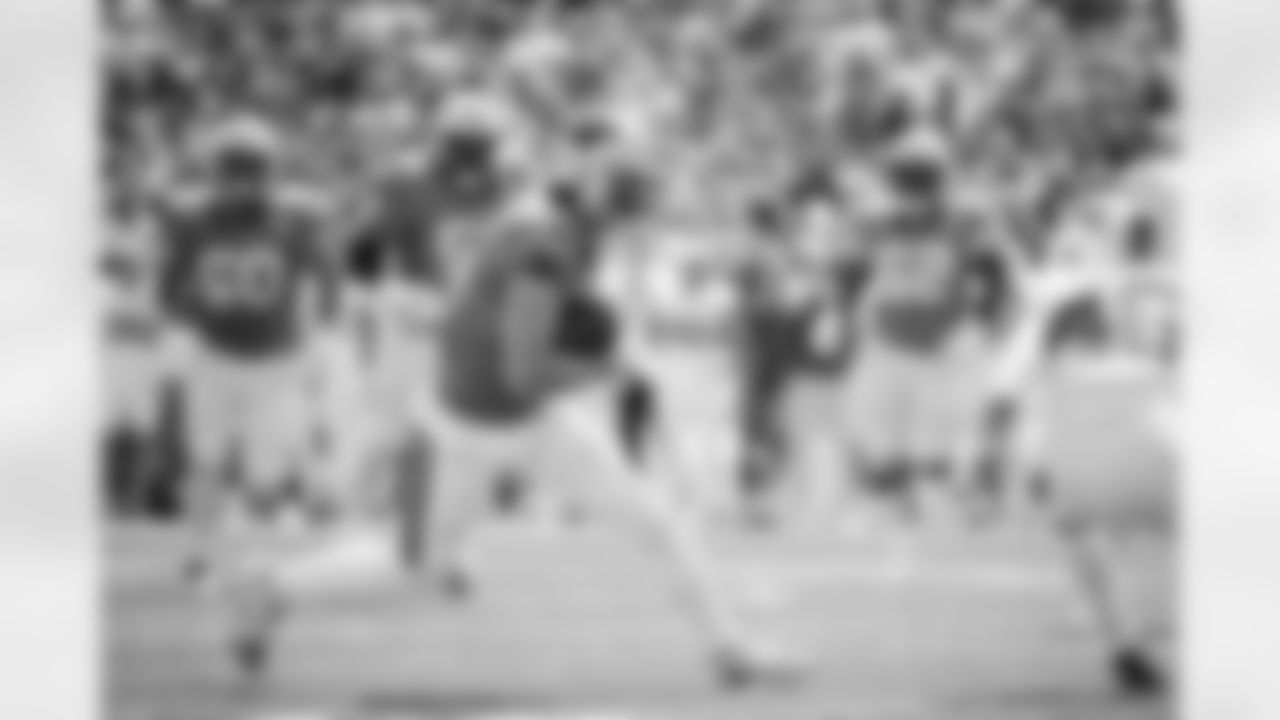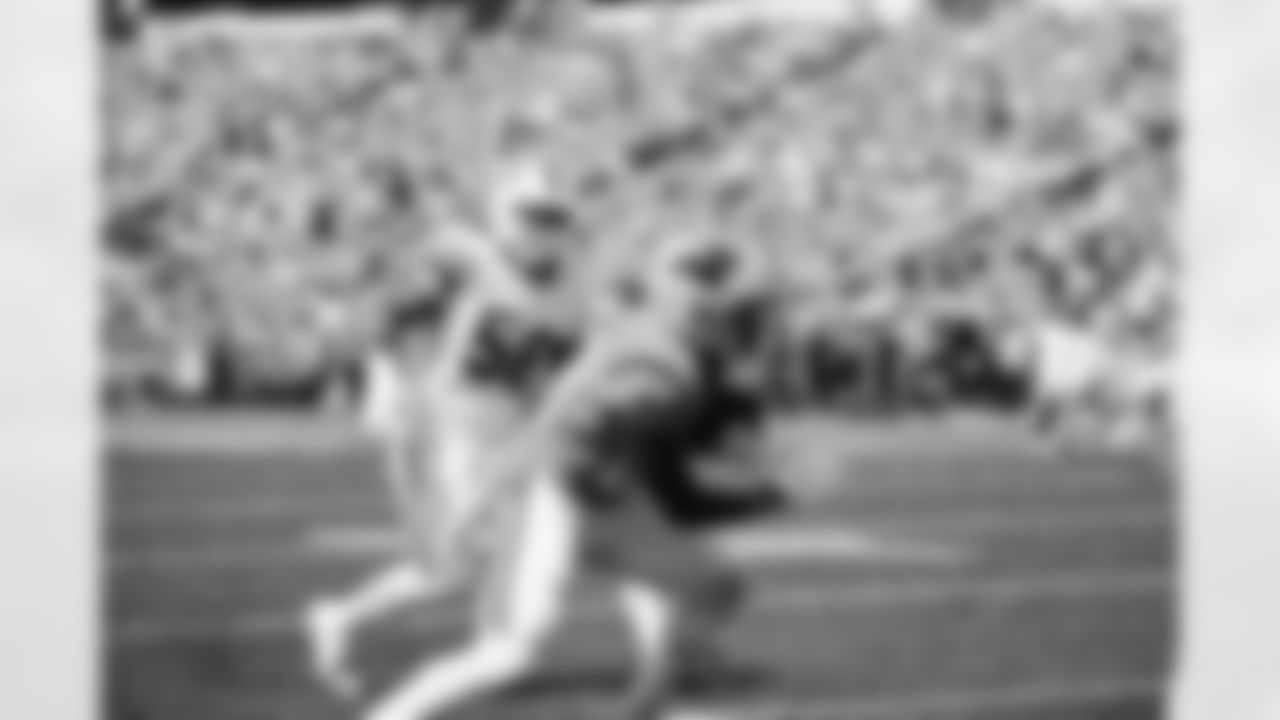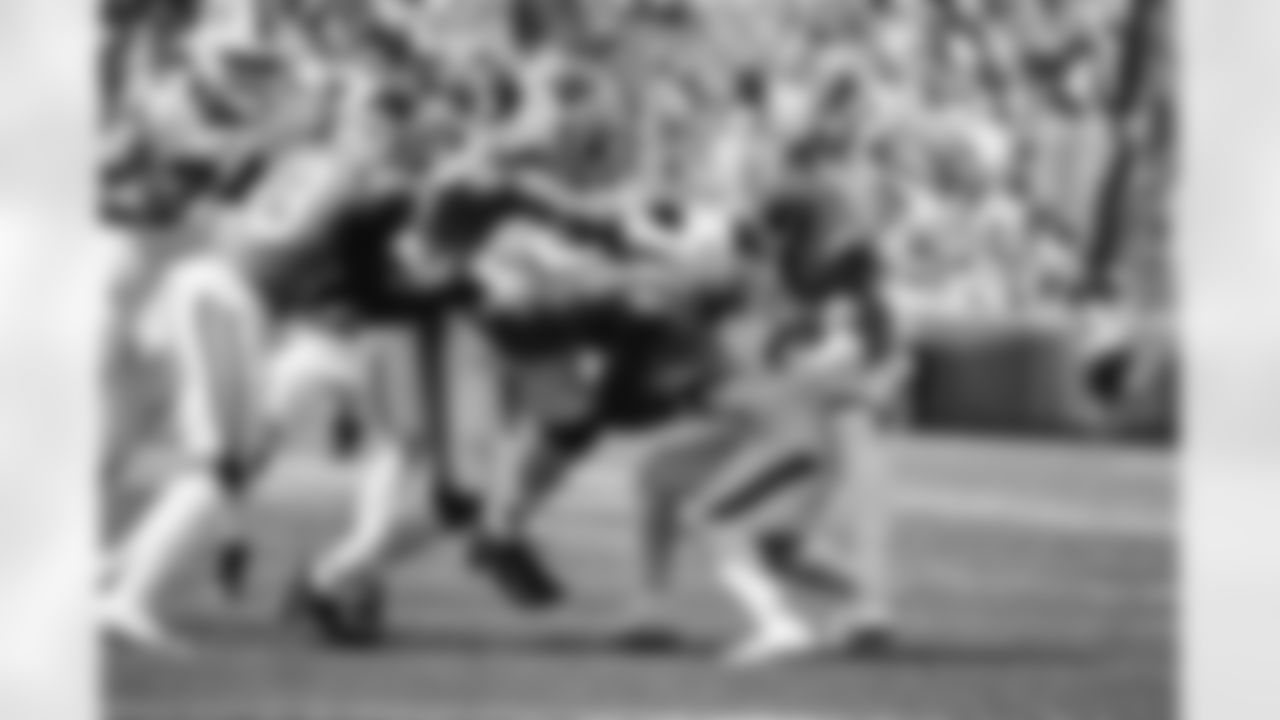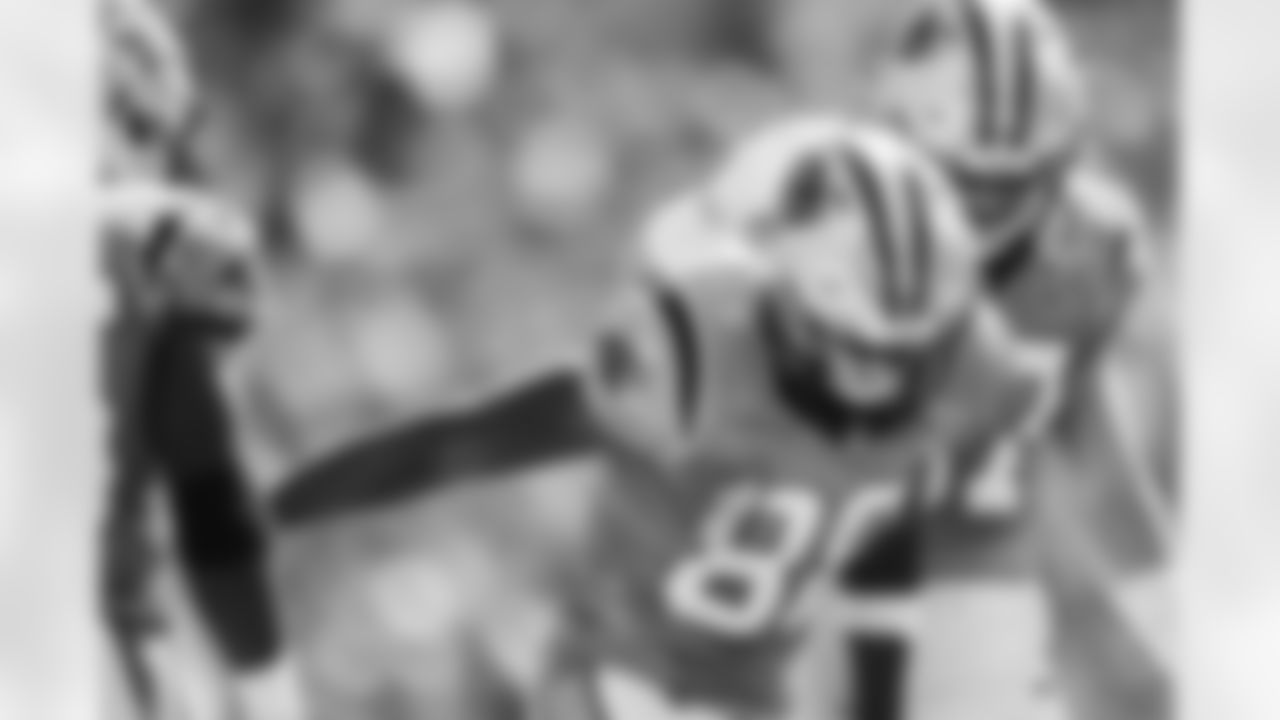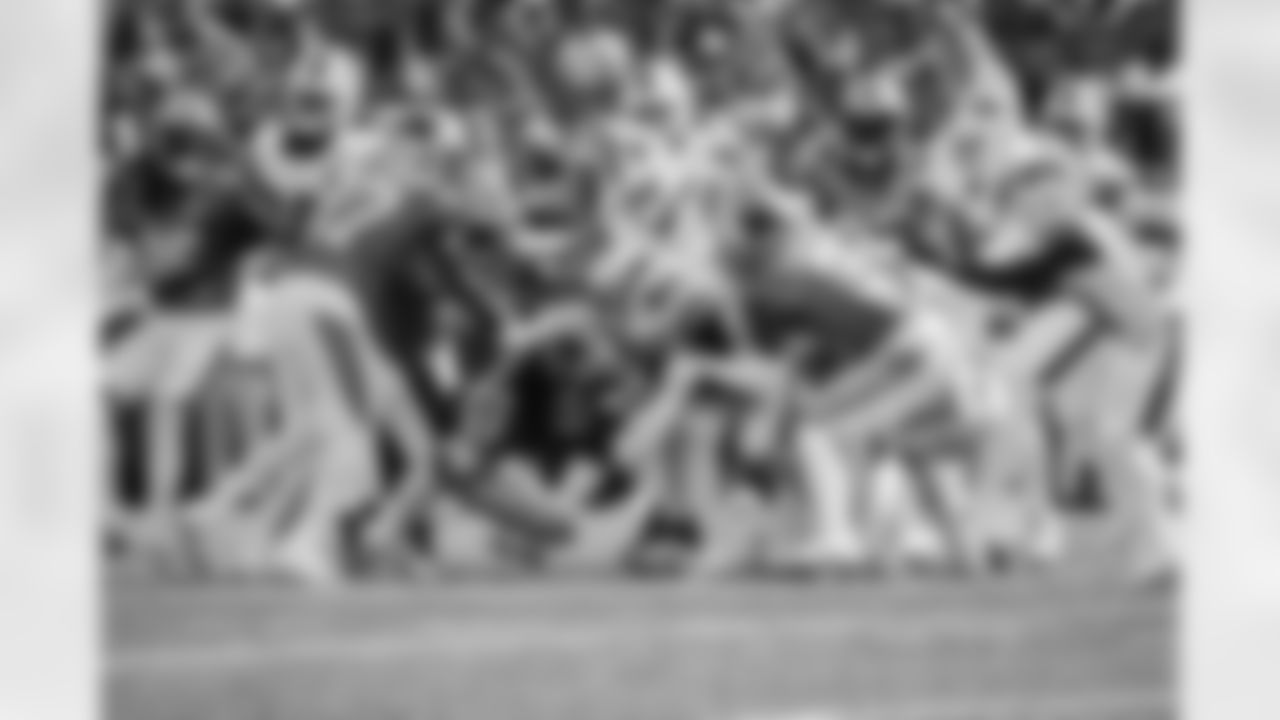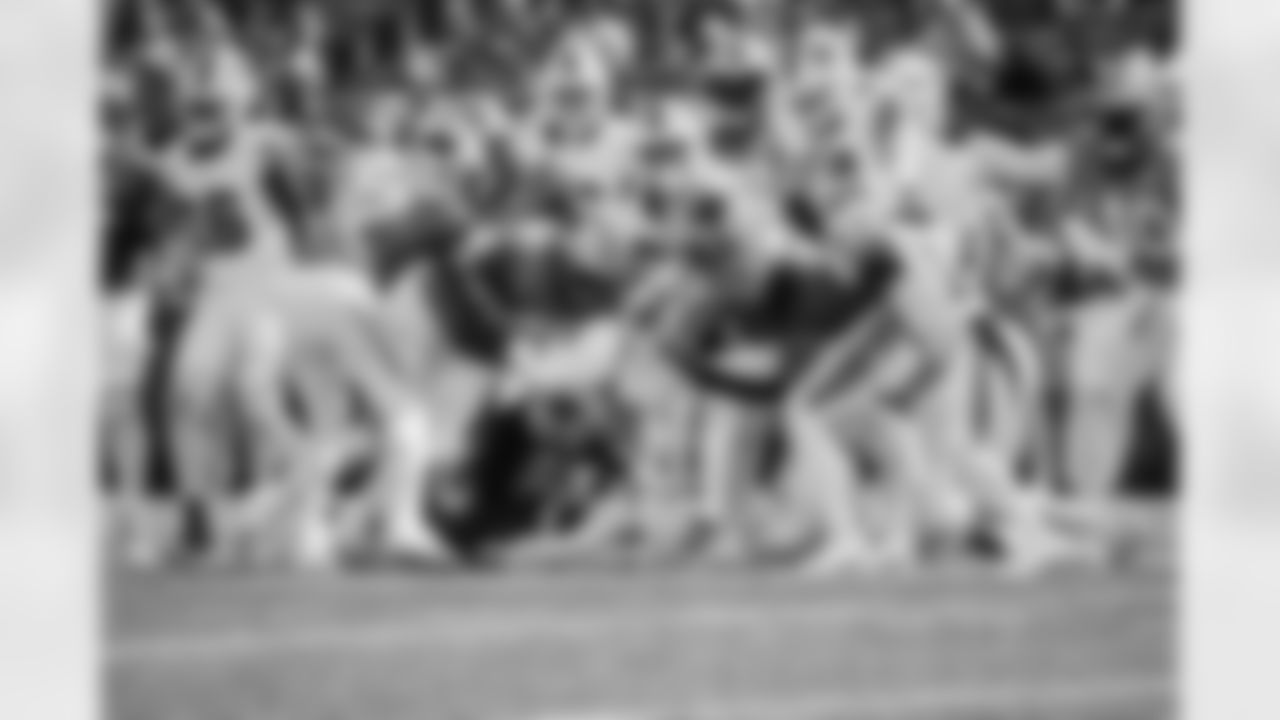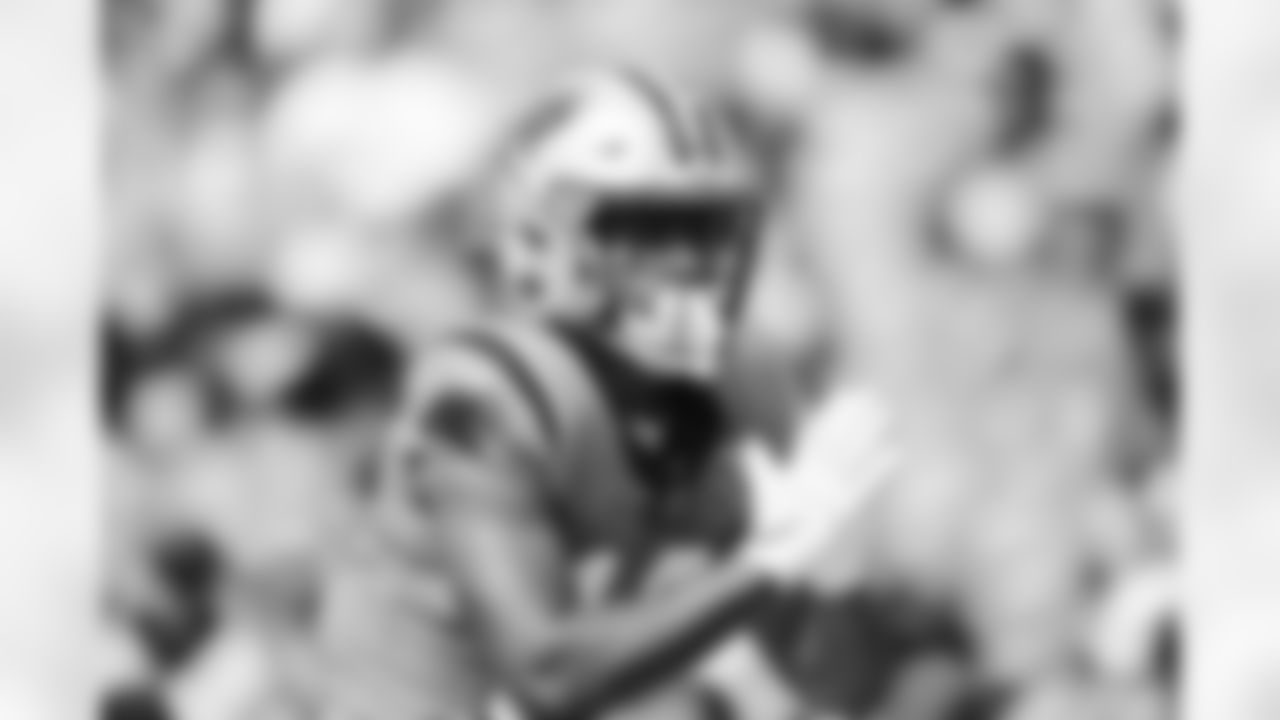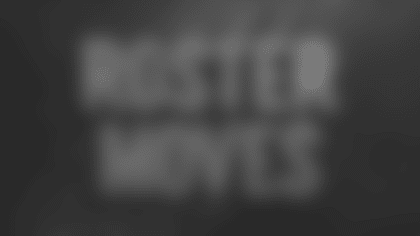CHARLOTTE — It was the buttons that ended up being the hardest part.
Three Carolina Panthers assistant coaches got to plug in and call plays for a half during the Panthers 31-26 win over the Bills in the final preseason game. Offensive coordinator Brad Idzik took over play calling duties from head coach Dave Canales for the second half. Linebackers coach Pete Hansen called the defense for the first half and defensive passing game coordinator Jonathan Cooley called the second half.
They were a part of the game plan ahead of time with Canales and defensive coordinator Ejiro Evero, prepared and ready. But those dang buttons.
"That mechanic was new for me because on game day, I'm not usually thinking about pushing a button to communicate," laughed Cooley, trying to be agitated but forced to be self-deprecating.
"The last time I called plays was a JV game at John Carroll back in 2013…anything I wanted to call, we signaled it into the middle linebacker and then he would give the calls of defense, right. Now we're pushing the button for the headset."
The blasted buttons in question are on the box that hooks onto a belt. The box is attached to a headset and that's what coordinators/play callers use to communicate to players on the field, other coaches on the sideline and even people in the box. There are four total, two on the top and two on the side and "You don't know which button to push until somebody tells you," explained Hansen, "and they all go to somebody different."
Idzik had the advantage of having called plays the week before as well, during the second half of the Panthers second preseason game versus the Jets. By the time he put on the play caller head set in Buffalo, he was an old pro…but he'd had his own tussle with the buttons the week before.
"I pressed like, the talk button, which actually muted me talking to the other coaches," admitted Idzik. The offensive coordinator headset he usually wears has a mere two buttons and double the buttons was double the problems.
Hansen's strategy stayed simple: "I just kept my finger on the one to the player. That was the most important one."
After the crash course on the job training with the buttons was complete, it just became about football, albeit football from a different point of view than these three coaches are used to on game day.
All have called plays at some point, Cooley at John Carroll as mentioned, Hansen while DC at UNLV and Idzik the week before against the Jets. And there is the history of calling plays on video games, although Idzik admits he got rid of his game console after becoming a coach, and Cooley only plays as an OC so he can conduct opposition research.
But the NFL is inherently different than the college game, and any video game that might be played. Furthermore, since it was the preseason, it was "a lot tighter menu," Cooley explained, "and so there's things that you would love to call, but we're not, you know, doing those things in preseason."
Instead, as he added, it was more "playing the game within the game, and just matching personnel that they were giving us."
The Bills personnel took a turn in the second half, as they ran out of running backs.
"All of a sudden they're going to play a different style of offense at the end of that game," Canales recapped. "Knowing they didn't have any running backs and having to, making sure you get good calls to combat what they might be trying to do and how they're attacking you."
The challenge, while unique, was the kind of adversity Canales wanted his coaches to face while calling plays. Games can't be scripted, despite what social media argues, and learning to adapt in the moment is necessary to become a play caller.
"These titles come with responsibility," Canales said, pointing to Cooley as an example; "and it's an ascension of where his career is headed, is to be a defensive coordinator at some point."

Knowing that Pete Hansen would be answering questions about his interlude as a play caller, one defensive player quipped, "ask him why he likes 'right tough field fire zone' so much."
So, we did.
"No real reason," Hansen shrugged. "It just pops into my head. I like it better."
The details of the play were kept close to the vest, propriety information that gamesmanship demands remain a secret. But upon hearing which player asked about the call, Hansen was able to share, "it was almost for him because it give him a chance to be in (more)."
Echoing Cooley's explanation, especially in the preseason, Hansen explained playing personnel is just as important as playing the playbook. In other words, the age-old adage, Jimmys and Joes versus Xs and Os. While it's something every coach on the field inherently understands, when the scope of their focus widens from the personnel in their unit, to the entire defense, the challenge of a play caller becomes much more prevalent.
"Can my calls help certain positions be in enough, like if we just went straight to nickel personnel, for example, the whole time, then the rotation might be off for the D line," explained Hansen. "It's almost like a moving self-scout.
"I'd like to think my focus on the situation is always the same, but it's probably a little ramped up when you're actually calling it, you know, the down and distance and different things and then looking down at the sheet and figuring out which part of the sheet I'm looking at."

Since this was the first (or second) time the three coaches called plays in a NFL game, the Panthers staff tried to surround them with the support they'd need—even if that support meant a bit of tough love.
Evero helped craft the call sheet for Hansen and Cooley, and in between series, he still manned the huddles like normal. But as for the flow of the game?
"He was just like, it's your show, call it," Cooley said.
That meant having plays that were lessons in what not to do: "Just some situations where they came out in, like a bigger personnel group, I would have probably changed personnel," Cooley explained. But there were also plays that paid off and proved to the defensive passing game coordinator that he was on the right track.
"There was a good call that helped us when DJ Johnson got a sack to help us get into third and long," he recalled. The Bills were facing a second-and-3 when Johnson sacked Anthony Brown for a loss of eight yards, setting up a third-and-11, then subsequently a punt.
"I thought the down and distance, I was expecting them to pass," Cooley continued. "So, I figured pressure would give us a shot to get them into a third and long situation. That was probably like, oh, that was a good call right there."
Idzik picked Canales' brain for advice, taking to heart even the most minute details.
"Dave was like, usually I stay 15 yards in front or behind, just stay out of the subs and stay out of the action," Idzik shared. "You want to have a clear mind, like you want to, you know, you're focused on play call and communication and that's giving the personnel early."
The biggest piece of advice though came from Jim Caldwell. The former Colts and Lions head coach stopped in on Idzik earlier in the week and told him, "'Hey, in these certain situations, just be armed with thinking about this.'
"So, I made a couple of little reminders on the call sheets…You can do the prep on the front end when you have a clear mind, you're in your office, there's no emotions attached to it. And kid you not, like three of those situations popped up in those two games and I went to the play call. A lot of that was because of the prep that (Jim) gave me.
"I went up to Jim, I was like, thank you. I might have gotten to the plays on my own. But I got to eliminate that piece of the thinking."

The flip side of having a situation in which he was totally prepared is, of course, a situation that went wrong.
"We had linemen come with a day and half notice in the Jets game, right," Idzik said. "So we have some of our core stuff is brought up in tempo packages and I wanted to get to some of our core stuff at certain times. I went to the tempo route and thank God we had some really smart quarterbacks that help you out too. I gave him a tempo play and he's like 'no, hey, let's make a long call'…and we were able to operate because (the lineman) wouldn't have known the tempo."
Those are the sort of circumstances that Canales wanted these play callers to experience though. The ups and the down's that come in an environment where things aren't as controlled and can't be as predicted. It's something Pete Carroll drove into Canales when the two were together in Seattle.
"He would always challenge me to say, 'Hey, you got to see more," Canales shared. "You can't just be staring at the receivers release this whole time. If you want to be a coordinator, see what everybody's doing. Did you notice this pass protection was messed up?'
"So, it really does expand your mind when you have to start thinking about the calls beyond just coaching your position."
By having someone else handle play calling duties for a half, it also allowed the first-time head coach time to focus on the things he needs to remember, well, as a head coach.
"I would say that I got to be more demonstrative about calling time outs," Canales admitted. "I still have a little bit of assistant coach in my mind to stay off, to stay behind the line.
"Even like the last game, we finally got into a good two-minute situation and I'm like waving time out from back here and the officials were nice enough to kind of come over and say, 'Hey, you kind of got to throw a fit and come out onto the field to get our attention. We're looking at the receiver and the line.' I'm just like, ok, rookie moment for me."
Carroll would let Canales call plays in mock games during practice. Letting his position coaches have the opportunity in preseason games was extremely important to the first-time head coach though.
"We're a developmentally minded organization and that's not just about our players. Pouring into them, they're ours the whole time," Canales said.

For those on the headset as well, the experience is incalculably valuable.
"I think it's just important anytime you can get on the job experience where you can get good feedback from your peers and just find ways to look for improvement. So now like when you get your opportunity, it's not your first time doing it," Cooley said.
Added Idzik, "Going forward, I always want to challenge myself to develop for whatever might come down the pipe in my future and I'm just super appreciative of going through those reps and then also to help Dave. Like now I can sympathize with what it's like on a game day."
And maybe above all, if any of the three are called upon to call a game in the future, they can strap on the headset and be ready…because now they'll know where the buttons are.
"It's big just to actually have done it on your feet," Hansen said. "We're all different kind of learners and, you know, for me to have experienced it, talking to a guy in the helmet, pushing the button, looking at the call sheet while holding the button. It's just all part of feeling like I've experienced it before."
View all the action from the Panthers' game in Week 3 of the preseason against the Buffalo Bills.

